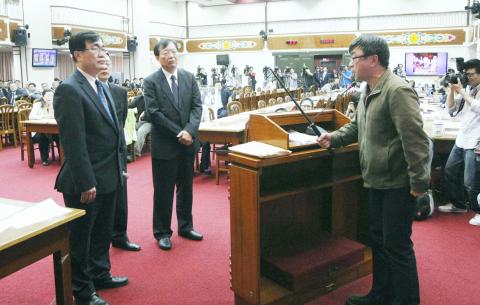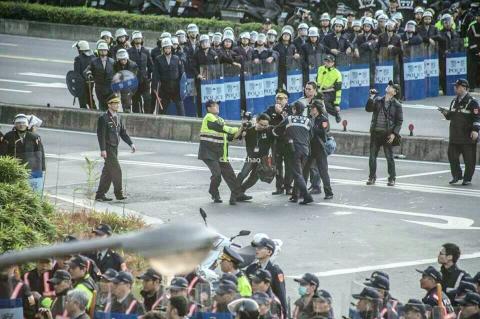Speaking about his experience of being evicted by police from the Executive Yuan in Taipei on Sunday, a student from Soochow University on Tuesday said he had “not expected the police to use such force.”
The student, surnamed Chen (陳), said he and some classmates had been sitting in protest against the cross-strait service trade agreement behind the Executive Yuan’s back gates, near Beiping East Road, when the police were about to start forcibly removing students from the premises.
“It was an area where there were fewer reporters present, and we were all driven away by the police,” Chen said, adding that the student who was in charge of the protest had specifically told them not to resist or cause any confrontation if the police acted against them.

Photo: Hsu Chai-chang, Taipei Times
“The student coordinator said: ‘Just sit tight, link your arms together and lie back,’” Chen said.
Chen said he was in the first row and was the second in the area to have been moved, adding that he had not expected to be hit with batons and kicked when he was “handled” by police.
“Even when I was curling up into a ball to protect myself, the police said I was not supposed to move,” Chen said.

Photo courtesy of Democratic Progressive Party Taipei City Councilor Chien Yu-yen
He added that officers told him to get up and start walking out, but when he complied they hit him on the back of the knee, causing him to fall forward.
They kicked him in the eyes, and he had lost his glasses in the process, he said, adding that he was diagnosed at the National Taiwan University Hospital with retinal edema, a slight concussion and bruising.
Although he knew he would be forcibly removed from the Executive Yuan, Chen said he had not expected such excessive use of force, adding that the experience made him angry at Premier Jiang Yi-huah (江宜樺) for saying that the police had removed the students in an amicable way.
“I never believed that Taiwan’s democracy would regress to how it was a decade ago, that is what saddens me the most,” Chen said.
Meanwhile, a student named Lo Wen-shao (羅文劭) said in a message posted on Facebook at 3am yesterday that the police rounded up the students on Sunday night after sending the media away, and hit everyone they could see.
“They did not even make a distinction between gender,” he said.
He said he was hit on the calf, adding that another officer had kicked him in the head and told him to get out.
“Have we killed, pillaged or committed arson? I do not understand how we, who were unarmed, nonresistant, and only wanting to defend the democratic system and our own future, warranted such treatment?” Lo wrote.

INVESTIGATION: The case is the latest instance of a DPP figure being implicated in an espionage network accused of allegedly leaking information to Chinese intelligence Democratic Progressive Party (DPP) member Ho Jen-chieh (何仁傑) was detained and held incommunicado yesterday on suspicion of spying for China during his tenure as assistant to then-minister of foreign affairs Joseph Wu (吳釗燮). The Taipei District Prosecutors’ Office said Ho was implicated during its investigation into alleged spying activities by former Presidential Office consultant Wu Shang-yu (吳尚雨). Prosecutors said there is reason to believe Ho breached the National Security Act (國家安全法) by leaking classified Ministry of Foreign Affairs information to Chinese intelligence. Following interrogation, prosecutors petitioned the Taipei District Court to detain Ho, citing concerns over potential collusion or tampering of evidence. The

NEGOTIATIONS: Taiwan has good relations with Washington and the outlook for the negotiations looks promising, Minister of Economic Affairs J.W. Kuo said Taiwan’s GDP growth this year is expected to decrease by 0.43 to 1.61 percentage points due to the effects of US tariffs, National Development Council (NDC) Minister Paul Liu (劉鏡清) said at a meeting of the legislature’s Economics Committee in Taipei yesterday, citing a preliminary estimate by a private research institution. Taiwan’s economy would be significantly affected by the 32 percent “reciprocal” tariffs slapped by the US, which took effect yesterday, Liu said, adding that GDP growth could fall below 3 percent and potentially even dip below 2 percent to 1.53 percent this year. The council has commissioned another institution

NEGOTIATIONS: The US response to the countermeasures and plans Taiwan presented has been positive, including boosting procurement and investment, the president said Taiwan is included in the first group for trade negotiations with the US, President William Lai (賴清德) said yesterday, as he seeks to shield Taiwanese exporters from a 32 percent tariff. In Washington, US Trade Representative Jamieson Greer said in an interview on Fox News on Thursday that he would speak to his Taiwanese and Israeli counterparts yesterday about tariffs after holding a long discussion with the Vietnamese earlier. US President Donald Trump on Wednesday postponed punishing levies on multiple trade partners, including Taiwan, for three months after trillions of US dollars were wiped off global markets. He has maintained a 10 percent

TRADE: The premier pledged safeguards on ‘Made in Taiwan’ labeling, anti-dumping measures and stricter export controls to strengthen its position in trade talks Products labeled “made in Taiwan” must be genuinely made in Taiwan, Premier Cho Jung-tai (卓榮泰) said yesterday, vowing to enforce strict safeguards against “origin laundering” and initiate anti-dumping investigations to prevent China dumping its products in Taiwan. Cho made the remarks in a discussion session with representatives from industries in Kaohsiung. In response to the US government’s recent announcement of “reciprocal” tariffs on its trading partners, President William Lai (賴清德) and Cho last week began a series of consultations with industry leaders nationwide to gather feedback and address concerns. Taiwanese and US officials held a videoconference on Friday evening to discuss the